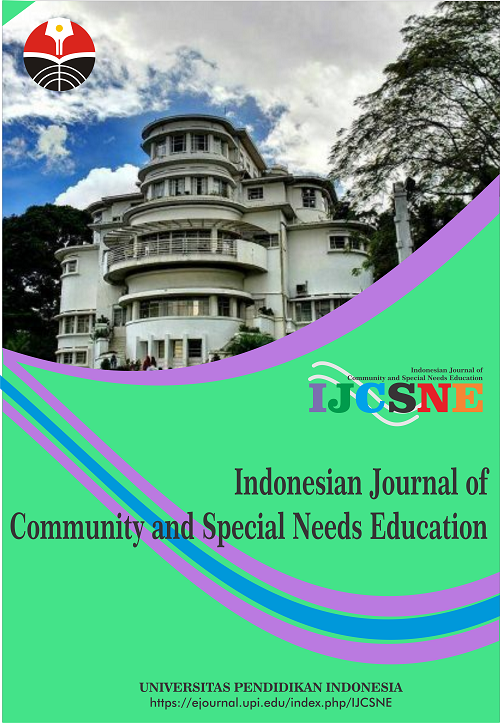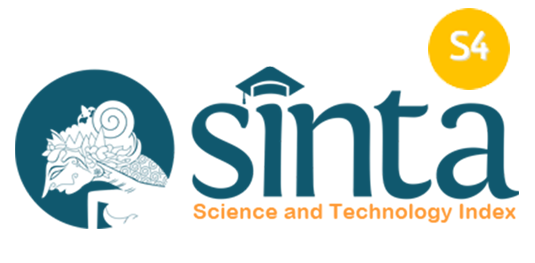Inclusive Education for Children with Disabilities: Overcoming Challenges and Embracing Benefits for a More Equitable Future
Abstract
Keywords
Full Text:
PDFReferences
Adesokan, A., and Bojuwoye, O. (2023). Teachers’ perceived barriers to inclusive education. ASEAN Journal of Community and Special Needs Education, 2(2), 91-96.
Ahmad, F. K. (2015). Use of assistive technology in inclusive education: Making room for diverse learning needs. Transcience, 6(2), 62-77.
Alnahdi, G. H., Alwadei, A., and Alharbi, N. (2024). Enhancing special education programs’ curricula for students with intellectual disabilities in Saudi Arabia: A call for personalized approaches and inclusive practices. Research in Developmental Disabilities, 151, 104785.
Azizah, N., Prasetyo, A.C., Dini, N., Wulandari, V., and Kruesa, M. (2022). Social inclusive education project (SIEP) as a community for handling children with special needs in rural areas. Indonesian Journal of Community and Special Needs Education, 2(2), 89-98.
Brede, J., Remington, A., Kenny, L., Warren, K., and Pellicano, E. (2017). Excluded from school: Autistic students’ experiences of school exclusion and subsequent re-integration into school. Autism & Developmental Language Impairments, 2, 2396941517737511.
Broderick, A., Mehta-Parekh, H., and Reid, D. K. (2005). Differentiating instruction for disabled students in inclusive classrooms. Theory into Practice, 44(3), 194-202.
Dunleavy, M., Dede, C., and Mitchell, R. (2009). Affordances and limitations of immersive participatory augmented reality simulations for teaching and learning. Journal of science Education and Technology, 18, 7-22.
Egbedeyi, T.F., and Babalola, A.E. (2023). Availability and challenges of inclusive lower primary education schools. Indonesian Journal of Community and Special Needs Education, 3(2), 93-102.
Evans, W., Gable, R. A., and Habib, A. (2021). Lessons from the past and challenges for the future: Inclusive education for students with unique needs. Education Sciences, 11(6), 281.
Faddillah, R.N., Nandiyanto, A.B.D., and Bilad, M.R. (2022) Literacy program for elementary school students about inclusive education in recognizing children with special needs. ASEAN Journal of Community and Special Needs Education, 1(1), 1-8.
Glushchenko, V.V., and Trubacheyev, E.V. (2025). Managing the social development of students with disabilities in inclusive universities: A conceptual approach. Indonesian Journal of Community and Special Needs Education, 5(1), 1-6
Jordan, A., Schwartz, E., and McGhie-Richmond, D. (2009). Preparing teachers for inclusive classrooms. Teaching and Teacher Education, 25(4), 535-542.
Lamichhane, K. (2013). Disability and barriers to education: Evidence from Nepal. Scandinavian Journal of Disability Research, 15(4), 311-324.
Lindsay, S., and Edwards, A. (2013). A systematic review of disability awareness interventions for children and youth. Disability and Rehabilitation, 35(8), 623-646.
Lourenco, G. F., Goncalves, A. G., and Elias, N. C. (2015). Differentiated instructional strategies and assistive technology in Brazil: Are we talking about the same subject?. Universal Journal of Educational Research, 3(11), 891-896.
Musayaroh, S., Asmiati, N., Utami, Y.T., Mulia, D., Sidik, S.A., Abadi, R.F., Pratama, T.Y., Maslahah, S., and Pramudyo, A.S. (2023). A digital accessibility and inclusive design-based e-module in higher education: Does it work in a classroom with a deaf student?. ASEAN Journal of Community and Special Needs Education, 2(1), 55-60.
Rose, A. J., Kelley, K. R., and Raxter, A. (2021). Effects of PEERS® social skills training on young adults with intellectual and developmental disabilities during college. Behavior Modification, 45(2), 297-323.
DOI: https://doi.org/10.17509/ijcsne.v5i1.82690
Refbacks
- There are currently no refbacks.
Copyright (c) 2025 Universitas Pendidikan Indonesia

This work is licensed under a Creative Commons Attribution-ShareAlike 4.0 International License.















